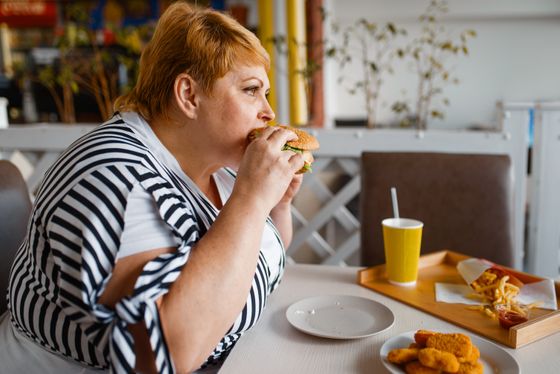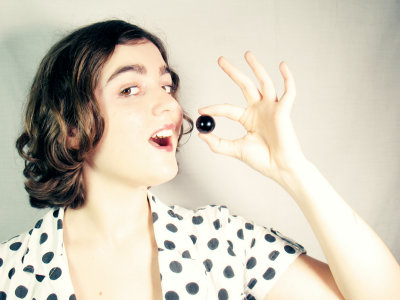What is the merit of giving up dieting to change body shape and eating according to intuition?

The world is full of different diets, and many people try to improve their diet to get a healthier and more ideal body. However, U.S. registered dietitians Elyse Resch and Evelyn Tribole advocate `` Intuitive Eating '', which ignores traditional dieting methods that limit diet, and attracts attention from people who are exhausted by diet culture Are gathering.
Intuitive eating: The anti-diet, or how pleasure from food is the answer, say its creators-CNN
The “intuitive diet” advocated by Resch et al. Recommends eating as if you are hungry like a child, and stopping when you feel full. 'This is a backlash against the diet culture. People are tired of being told what foods to eat,' commented Tribole. 'It's time to let go of the harmful diets. Data shows that 95% of those who have failed dieting have failed and two-thirds of those who have lost weight are rebounding,' Resch said. Gives a negative view on traditional dieting methods.
The problem is that eating too much junk food and eccentric diets can lead to obesity, but eating disorders caused by dieting are also harmful to humans. Instead of focusing on someone's recommended dietary restrictions, Resch and his colleagues recommend that you follow your own intuitive diet. 'The only option is to trust your own body and feel the freedom and pleasure that comes with eating,' Resch said, arguing that we need to escape the notion that 'we should do this.' .

'Intuitive diet' refers to observing the three elements of instinct, thinking and emotion and listening to the voice of one's own body. Resch and his colleagues state that they are important in practicing an “intuitive diet”:
◆ 1: Recognize the satisfaction of eating
First, Resch and his colleagues argue that people need to regain the feeling of being 'satisfied with eating food.' In today's diet, where it is recommended to maintain an ideal body, many people are negative about 'getting satisfied with meals', but are aware of satisfaction with 'intuitive meals' That is very important.
'Concentrating on being satisfied and knowing about hunger, satiety, and physical needs is an intuitive dietary guideline.' 'Satisfaction means that you should not eat when you are not hungry and start eating when you are hungry. It's important information in making a decision, 'Resch says, but emphasizes that' intuitive diet 'is not a diet, and weight management is not the goal.

◆ 2: Reject diet culture
'Intuitive diet' started with a rebellion against the traditional diet culture, saying that to become a person worthy of love from others, you must diet and get the ideal body. Breaking away from thinking is an important principle of 'intuitive eating'. Because weight management is not important in an 'intuitive diet', basically, we do not monitor weight gain or loss on a scale.
'The prejudice against weight, which is part of the diet culture, is that if someone doesn't have the ideal body, he or she has some problems.' It's cruel and harmful to tell people who are programmed to lose weight, 'said Resch.
The dangerous aspect of dieting is that 'temporary dieting can be effective and reduce weight'. However, a 2012
Resch says that dieting can lead to dangerous habits such as eating disorders such as vomiting and overeating, and laxative abuse. 'Our intuitive diet is to eat a sustainable and healthy diet. We don't focus on weight because weight itself is not related to behavior.' Resch said.

◆ 3: Build a peaceful relationship with food
In the diet method, it is not unusual for certain ingredients to be banned, such as 'Do not eat because this ingredient is fat,' and 'Do not eat because this ingredient is bad for your health.' However, Mr. Resch points out that it is a human who wants to eat more if something is forbidden, and if you forcibly forbid a specific meal, you may eventually overeat in a recoil .
Therefore, when starting an 'intuitive meal', Resch and others created a 'list of ingredients that you should not eat', and for each ingredient, 'you should not eat too much' 'never eat' We recommend labeling such as In addition, after making the list, select one of the ingredients and say, 'Eat the ingredients as much as you want in a quiet and calm place 2-3 hours after eating.'
'Creating a peaceful relationship with food means giving yourself permission to 'eat anything.' There are no good or bad ingredients, and there are no factors to judge.' Resch stated that all foods should be recognized as 'emotionally equivalent.' Rather than forcing certain foods to be rejected, thinking that 'all the foods do not make a big difference' will allow you to eat the foods your body wants.

◆ 4 : Welcome hunger
When you are on a diet, the association of “I am hungry = I need to eat, that is, I will gain weight” works, and it becomes frightening to feel hungry. But hunger is a normal reaction of the body and should not be feared, Resch and colleagues point out.
If you can feel hungry, you won't have to resist eating. Rather than enduring hunger and trying to eat as little as possible, it is recommended in an “intuitive diet” that eating is straightforward before hunger rises to its limit.

◆ 5: Enjoy satiety without looking at smartphones
He says that once he can recognize hungry honestly, he needs to feel full. However, watching a TV or smartphone, working, or driving a car during a meal makes it difficult to listen to the fullness of the body. So 'Intuitive Meal' recommends that meals be 'sacred time' as much as possible.
Tribole recommends eating out in a quiet and calm environment, eliminating TVs, smartphones and other electronics. Then, while eating, ask yourself the question, 'I'm full or how full?' If it is difficult, stop at three points: “Before eating,” “Mid meal,” and “After eating,” and gradually evaluate your own fullness by consciously evaluating your fullness. It will be felt about.

◆ 6 : Resist the “meal police” in the brain
Tribole and colleagues point out that when you practice an 'intuitive diet', you may find yourself feeling guilty about your diet due to dietary knowledge that has permeated your brain and advice from others. In modern society, the labels of `` good foods '' and `` not good foods '' are made everywhere, and even if you are alive, you will absorb that knowledge and be affected .
'This psychological effect is very powerful. We must distinguish between accurate thinking from dietary culture and distorted thinking from dietary culture,' Resch says, and continues with an 'intuitive diet.' He argued that he needed to resist the 'meal police' in his brain.

◆ 7: Do not deal with stress by eating
Some people try to change their mood by 'burning out' when they encounter stressful or sad events. However, burns often eat a large amount of food regardless of their hunger, which is contrary to the philosophy of 'intuitive meals' that listens for hunger and satiety.
'We need to be aware that emotions can change the way we judge a meal, which can separate the feelings of comfort from burns,' commented Resch. `` Food does not restore emotions, '' Tribole points out, touching friends and family, strolling in nature, meditating, reading, playing with pets, and consulting good counselors. And said it was better to deal with stress.

◆ 8: Take care of your body
The ultimate goal of an “intuitive diet” is to build a healthy relationship between food, body and mind. Weight management through dietary restriction is contrary to the idea of 'intuitive diet', but it is important to get enough sleep, reduce stress, live a work-life balance-oriented life, and engage in healthy exercise. Self-care is important, said Tribole.
'A lot of people who avoid certain foods claim that it's' for health, 'but the real intention is' to change shape. ' In that case, it interferes with the 'intuitive diet'. ' Although many people are ashamed of their physical form due to other people's perspective and social mood, Resch believes that the ideal physical form is individual.
'There are many people who have a large body, but their body and diet are in harmony. They are bigger than others, but their cholesterol and blood pressure are ideally healthy,' said Resch. He stated that simply listening to one's body can make a person healthy.

Related Posts:
in Food, Posted by log1h_ik







